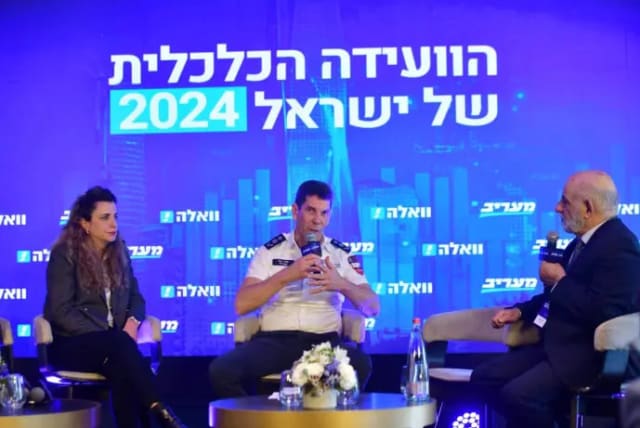Magen David Adom does not appear in Israel’s state budget - Eli Bin

MDA’s resources are acquired through many donations, which also come from philanthropists in Israel but mainly from abroad.
A special health panel moderated by economic commentator Shlomo Maoz was held Tuesday at the 2024 Business Conference at the Carlton Tel Aviv Hotel under the auspices of Bank Leumi. Participating in the panel were Michal Gur, Deputy CEO, Director of the Life & Health division of Migdal Insurance and Finance; Eli Bin, Director General of Magen David Adom; and Oshrat Ben Shabbat, CEO of Ginger.
Eli, how do MDA personnel arrive so quickly at the scene of events? I assume you have a large budget from the state.
“Many people here may not know that MDA doesn’t even appear in the budget of the State of Israel. We have no budgetary allocation, even though the state purchases services from us, and we have arrangements for special activities. I don’t know of a similar situation in the world in which a country expects a national emergency organization to prepare and respond to such complex challenges, but it doesn’t put it in its budget.”
So where does the money come from?
“Magen David Adom’s resources are acquired through many donations, which also come from philanthropists in Israel but mainly from abroad. All the technology, resources, and vehicles come from donations. The state does not put its hand in its pocket for us. We have developed special methods that other agencies around the world have emulated. We have a system that identifies which ambulance driver is closest to the event, and we can quickly send them there. We have also developed our capabilities using helicopters that we recently acquired, special boats stationed in the Sea of Galilee and now also in Eilat, and special vehicles, including 600 motorcycles that arrive at the scene before ambulances. We’re talking about 35,000 people who are involved in saving human lives.”
Michal, life expectancy increases every ten years by two to two and a half years. What do you suggest people do to prepare for a rainy day?
I think that the issue of health insurance and long-term care has become at least as important to the public as pension savings. We need to see how the insurance companies, the state, and the health funds find a common way to provide a satisfactory response to the public. This applies to health insurance, but also to activities outside the basket of health services, such as surgery. We are in the midst of healthcare reform, and its vision is correct – to take the issue of health insurance, ensure a public layer, above it place a layer of additional health services at extra cost (Shaban), and health insurance should provide the third layer. This is an excellent vision, but we need to see if the additional health services can provide a response for those who will switch from private insurance to a Shaban policy.”
Are people who took out long-term insurance foolish?
“There is no company that sells private long-term care insurance today. Taking a risk in a guaranteed fixed rate for 70 years ahead cannot hold water. We also withdrew from this insurance, and I think the entire issue needs to undergo a change in mindset. Until retirement age, there is insurance for loss of work capacity and a much more suitable package. From retirement age, one in three people require nursing care, making it a financial need and not an insurance issue. Therefore, just as we save for retirement, we need to save for long-term care.”
Oshrat, you’ve set up an entrepreneurial company, and you say you have a solution to the insurance issue. “Ginger is a startup in the insurance world. I identified a need of employees in high-tech or industrial companies that need its application to the insurance easily and simply. We have developed a system that makes the entire subject of insurance accessible in the world of travel abroad and the world of health insurance. An employee can log in and see all of the insurance conditions. We are the broker that represents the employee vis-à-vis the insurance companies, and we make the insurance solution accessible to the customers as an entity that handles and operates the service.”
During the conference, MDA Director General Eli Bin was awarded the Social Action Award for his contribution and activities in the “Iron Swords” war.
Jerusalem Post Store
`; document.getElementById("linkPremium").innerHTML = cont; var divWithLink = document.getElementById("premium-link"); if (divWithLink !== null && divWithLink !== 'undefined') { divWithLink.style.border = "solid 1px #cb0f3e"; divWithLink.style.textAlign = "center"; divWithLink.style.marginBottom = "15px"; divWithLink.style.marginTop = "15px"; divWithLink.style.width = "100%"; divWithLink.style.backgroundColor = "#122952"; divWithLink.style.color = "#ffffff"; divWithLink.style.lineHeight = "1.5"; } } (function (v, i) { });


